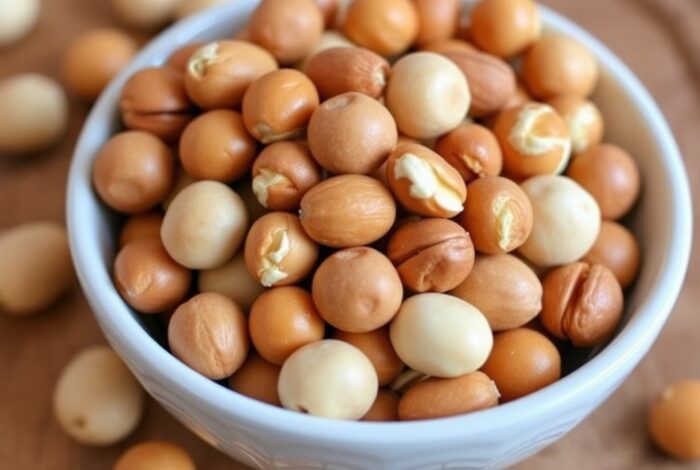Let’s talk about something that’s probably on your mind if you’re watching your cholesterol – nuts! These tiny nutritional powerhouses might just be the snack you need in your life. I’m going to break down everything you need to know about the best nuts for managing cholesterol levels, backed by solid research and practical advice you can actually use.

Why Nuts Are Your Heart’s Best Friend
You might be wondering if nuts are really all they’re cracked up to be (pun intended!). The short answer? Yes! Research from the American Heart Association shows that regular nut consumption can work wonders for your heart health. These little gems are packed with healthy fats, fiber, and plant sterols – three things that can help knock down those pesky cholesterol numbers.
Let’s get into the specifics of how nuts help with cholesterol:
- They’re rich in unsaturated fats that help lower LDL (the “bad” cholesterol)
- Their fiber content helps sweep excess cholesterol out of your system
- Plant sterols in nuts actually block cholesterol absorption
The Top Nuts for Fighting High Cholesterol
Walnuts: The Champion of Heart Health
If nuts were in a superhero movie, walnuts would definitely be the main character. They’re loaded with omega-3 fatty acids and have more research backing their cholesterol-lowering effects than any other nut. A meta-analysis published in the Journal of Nutrition found that people who ate walnuts regularly saw significant drops in their total and LDL cholesterol.
How many should you eat? About a handful (1 ounce or 28g) daily does the trick.
Almonds: Your Daily Defense Against High Cholesterol
Next up are almonds. These nuts are like your reliable best friend – always there to help out. Clinical trials have shown that eating almonds regularly can lower LDL cholesterol by up to 5%. Plus, they’re versatile enough to eat as a snack, throw in your oatmeal, or sprinkle on your salad.
Pistachios: The Green Machine
You’re in luck with pistachios! These green nuggets of goodness are particularly effective at improving your cholesterol profile. Studies from the International Journal of Molecular Sciences show they help boost HDL (good cholesterol) while lowering LDL. They’re also super satisfying – taking time to shell them can help you eat more mindfully.
Macadamia Nuts: The Unexpected Hero
Don’t let their rich taste fool you. Macadamia nuts might seem decadent, but they’re surprisingly good for cholesterol management. They’re packed with heart-healthy monounsaturated fats that help reduce inflammation and improve lipid profiles.
The Science Behind Nuts and Cholesterol
Let’s geek out for a minute (but in a fun way!) about why nuts work so well for managing cholesterol. It’s actually pretty fascinating stuff.
When you eat nuts regularly, several things happen in your body:
- The healthy fats help replace less healthy fats in your diet
- Fiber helps bind to cholesterol in your digestive system
- Plant compounds called sterols compete with cholesterol for absorption
A comprehensive review in the American Journal of Clinical Nutrition looked at multiple studies and found that eating just 2 ounces of nuts daily could lower total cholesterol by up to 5% and LDL cholesterol by up to 7%.
Do Nuts Increase Cholesterol? Myth vs. Reality
Here’s a question I get a lot: “Won’t eating fatty nuts raise my cholesterol?” Nope! This is one of those nutrition myths that just won’t go away. While nuts are high in fat, it’s the good kind your body needs. Studies show that people who eat nuts regularly actually have better cholesterol levels than those who don’t.
Best Practices for Adding Nuts to Your Diet
The trick isn’t just knowing which nuts to eat – it’s knowing how to add them to your diet without going overboard. Here’s what works:
Start small – aim for about 1-2 ounces daily. That’s roughly:
- 24 almonds
- 14 walnut halves
- 48 pistachios
- 12 macadamia nuts
Smart Ways to Include More Nuts in Your Diet
You don’t have to eat nuts straight from the bag (though that’s perfectly fine!). Try these easy ideas:
- Sprinkle chopped walnuts on your morning yogurt
- Add sliced almonds to your salads
- Keep a small container of pistachios in your desk drawer
- Use ground nuts as a crunchy coating for fish or chicken
The Triglyceride Connection
Let’s talk about something that often goes hand-in-hand with cholesterol – triglycerides. The good news? Many nuts that help with cholesterol also help lower triglycerides. Walnuts and macadamia nuts are particularly effective for this.
Best Nuts for Lowering Triglycerides
Research from Harvard Medical School suggests these nuts are particularly good for managing triglycerides:
- Walnuts (those omega-3s are key)
- Macadamia nuts
- Brazil nuts
- Pecans
Can You Eat Too Many Nuts?
Here’s the deal – nuts are healthy, but they’re also calorie-dense. While they won’t directly raise your cholesterol, eating too many could lead to weight gain, which might affect your cholesterol levels indirectly.
Finding the Sweet Spot
The magic number seems to be about 1-2 ounces daily. This amount gives you all the heart-healthy benefits without going overboard on calories. Think of it as a small handful – nature’s perfect portion size!
Nuts and Overall Heart Health
The benefits go beyond just cholesterol. Studies show that regular nut consumption can help:
- Lower blood pressure
- Reduce inflammation
- Improve blood vessel function
- Decrease heart disease risk
Making Smart Choices: A Quick Guide
Raw vs. Roasted
Both are good! Raw nuts have slightly more nutrients, but roasted nuts are often more enjoyable. Just avoid nuts roasted in oils or heavily salted.
Storage Tips
Keep your nuts fresh by:
- Storing them in an airtight container
- Keeping them in the fridge for longer shelf life
- Buying only what you’ll eat within a month or two
Special Considerations
Allergies and Alternatives
If you’re allergic to tree nuts, don’t worry! Peanuts (technically a legume) offer similar heart-healthy benefits. Cholesterol friendly seeds like pumpkin and sunflower seeds are great options too.
The Bottom Line
Including nuts in your diet is one of the easiest and tastiest ways to help manage your cholesterol levels. Remember:
- Aim for variety – different nuts offer different benefits
- Stick to about 1-2 ounces daily
- Choose raw or dry-roasted options when possible
- Make them part of a heart-healthy diet, not a magic bullet
Looking Ahead: Making Lasting Changes
Successfully lowering your cholesterol isn’t about quick fixes – it’s about creating sustainable habits. Adding nuts to your diet is an easy change that can make a real difference.
Start small, be consistent, and most importantly – enjoy them! After all, how often does something that tastes this good turn out to be so good for you?
Remember, while nuts are great for managing cholesterol, they work best as part of an overall healthy diet and lifestyle. Talk to your doctor about including nuts in your cholesterol management plan, especially if you’re taking medications or have other health conditions.
Happy snacking – your heart will thank you!

Sandra Hernandez, a resident of New York, is an active contributor on lifebing.com. Her passion for knowledge fuels her writing journey as she delves into fascinating topics that capture her curiosity.
